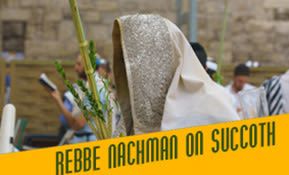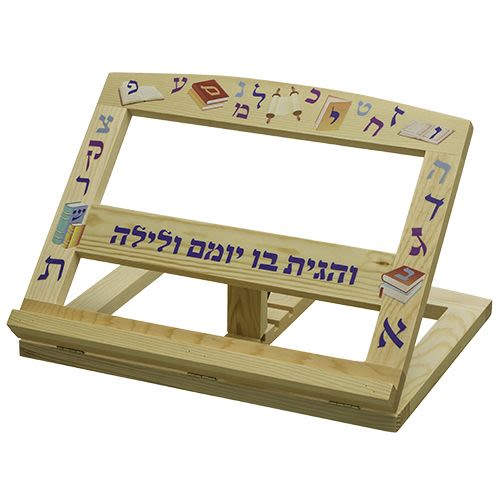
Enemies First
In fact, that understanding is one of the keys that can give a person the strength to go beyond his obligation, and to bear the burdens...

Enemies First!
The Torah commands, “If you see the donkey of your enemy falling under its burden… you shall surely help him unload it” (Shemot 23:5). Similarly, there is a mitzvah to help someone place a load on his donkey. But what should we do if we encounter both mitzvot at the same time: one man needs to unload his donkey, while another man needs to place a heavy package on his? The Sages tell us that we should first help the man who needs to unload his donkey, to relieve the animal from its suffering as quickly as possible. The other man can wait. However, if it is our friend’s donkey that is suffering under a burden, and our enemy’s donkey waiting to be loaded, then we should help our enemy first, because overcoming our own negative inclination is more important. Even though the obligation to relieve an animal from its suffering – the mitzvah of tzar ba’alei chaim – is from the Torah, we are permitted to postpone it in order to eliminate our bad middot; for the mitzvah to improve our character is even greater (Bava Metzia 32b).
Forbearance and Forgiveness
Our Sages have taught that “Jerusalem was destroyed only because people followed the letter of the law” (Ibid. 30a). The simple meaning of this is that when people had disputes, no one was willing to settle for less than the full amount to which he was entitled, and no one was willing to pay more than he was strictly obligated.
If so, however, this teaching of the Sages is very difficult to understand. It is true that the Torah wants us to “go beyond the letter of the law”: to do more than we are required, and to overlook the fact that others do less. But the Torah never suggests that a failure to conduct ourselves in such a way could lead to the terrible punishments of destruction, death, and the sufferings of exile!
Perhaps we can understand this in the following way: The real source of the accusation against Jerusalem, the real reason for the decree of destruction, was that the people committed very serious transgressions. Nevertheless, despite their transgressions, if these same people had been accustomed to overcome their negative and selfish impulses in other areas of life, if they had worked to develop good middot and had treated each other with kindness and patience, going beyond the letter of the law, then they would have aroused supernal forces of conciliation and forgiveness which would have held back the forces of destruction – because “when a person is forbearing in this world, his sins are forgiven from Above” (Yoma 23a).
Going Beyond Obligation
Rabbah bar bar Chana, the Talmudic Sage, once hired a number of workers to move a large barrel of wine (Bava Metzia 83a). The workers were careless and the barrel fell and broke. When the matter came before Rav, who was one of the leaders of the generation, he ruled that the workers were not obligated to pay for the damage. “But they were careless!” Rabba bar bar Chana said. “Is that really the law?”
Rav answered him with a verse: “So that you should walk in the way of good men…” (Mishlei 2:20), which means, according to Rashi, (Loc. cit.) that one should “go beyond the letter of the law.”
Later, the same workers complained to Rabbah bar bar Chana that they were hungry. “We are poor men! We worked hard to move the barrel. Now we need to buy something to eat.” Again, Rav ruled in favor of the workers, and ordered Rabbah bar bar Chana to pay them for their efforts.
“Is that really the law?” he asked again.
This time Rav answered him with the end of the same verse: “…and keep the paths of the righteous.”
The story can be understood as follows. It is likely that if an ordinary person had asked about the same case, Rav would have decided in his favor. According to the law, the workers were responsible. But since Rabbah bar bar Chana was his leading disciple, Rav decided to teach him an important lesson: a person must be willing to go beyond the letter of the law. There are times when a person must forgo what is rightfully his, such as in this case, where the workers were all poor men. Rabbah bar bar Chana should not have asked them to pay for the damage.
Similarly, according to the law, there was no need to pay the workers for their efforts. But since Rav was also Rabbah bar bar Chana’s teacher, he was entitled to rule that he must pay, in order to teach him to go beyond the letter of the law. (See the commentary of the Vilna Gaon on Mishlei 2:20 for a slightly different explanation of Rav’s ruling. According to that explanation, what Rav told Rabbah bar bar Chana was actually the law, but only for him, since Tzaddikim are required to follow laws that are stricter than the laws for ordinary people. That is why Rav quoted a verse about “the paths of the righteous.”)
On the simplest level, the Talmud tells this story to teach us that we too should go beyond our obligations. But we should also approach this story with a deeper and more encompassing sense of why things happen in the world, with the belief that every detail of this story was the result of Divine providence. We must believe that it was God’s plan that all this should happen precisely to Rabbah bar bar Chana, with a barrel of expensive wine, with those particular poor workers, after so many hours of labor, and that in the end, he would not only absolve them for the damage, but he would also have to pay them for their time. We should understand that Rav’s decision, and Rabbah bar bar Chana’s fulfillment of it, brought about a spiritual rectification which was necessary for the world at that point in history, and a mitigation of heavenly judgments above and below. And so the Talmud tells us this story, to teach us a lesson about Divine providence and about the greatness of Tzaddikim, who live with full faith in the justice of God.
In fact, that understanding is one of the keys that can give a person the strength to go beyond his obligation, and to bear the burdens and trials that life can bring. The Baal Shem Tov (Ben Porat Yosef, p. 111b) taught this in connection with the verse: “Alufeinu misubalim…” (Tehillim 144:14), which means literally that “our oxen are heavily laden” with produce and wealth. But “alufeinu” can also be taken as a reference to the “Alufo shel Olam” – the Master of the World, and the verb lisbol can mean “to bear” or “to endure suffering.” Hence the verse can be understood as teaching that if we live with awareness that God is our Master (alufeinu), and we remember that everything that happens is from God, then all our problems and burdens will become bearable (misubalim).
Every person experiences difficulties in life – whether they involve personal relationships or money, the home or the workplace – but the key to dealing with all of them is to understand that they are sent from God. The question is not how tough we can be in business, but how tough we can be with ourselves. Can we be patient and forgiving when people treat us unfairly? Can we relinquish control and expectations when things don’t go our way? Can we accept all this in love, realizing that it is for the sake of our eternal good? That is the real “business” of life. For that is how we will repair our souls, and all the supernal worlds that are connected to us.
Hidden Profits
The Talmud lists seven things that are concealed from a human being; one of them is the knowledge of which economic activity will lead to a profit (Pesachim 54b). Sometimes, a person starts a business with the expectation of making a fortune, yet he doesn’t make a penny. But then, in the process of cutting his losses and liquidating his investments, he stumbles on a lead that eventually becomes a lucrative enterprise in an entirely different area of business.
It is impossible for us to know from where we will have mazal, or which activity will enrich us. We can only do our best and turn to God for help. Hence, we should never be too exacting with others in business matters, since we can never be sure how things will turn out, or which path will bring us success. It is for that reason that even in the world of business, the best advice is to act generously and graciously, and to make concessions whenever possible.
Spiritual Success
The same can be said about spiritual growth and spiritual profits. In general, a person cannot know where he will meet with success and blessing, and the efforts he makes towards a particular goal may yield their fruits in an entirely different area.
Consider, for example, a person who is suffering because he is being treated unfairly by coworkers or members of his family, and all his efforts to improve the situation have been unsuccessful. The best advice for such a person is to accept the situation with love, and to know that is has been given to him from above – alufeinu mesubalim – in order to purify his character. If he continues to pray to God for help in coping with the situation, and to conduct himself according to the Shulchan Aruch, he may discover one day that he has been elevated to astonishing spiritual heights and to a level of refinement he would never have imagined possible. With time, he may find that he has been granted an entirely new level of understanding and spiritual sensitivity in Torah study and in prayer – and it all because he continued to serve God despite the suffering that was decreed for him.
Thus, in the end he may realize that it was precisely the most difficult situation that brought him the greatest spiritual benefit, and the source of his success was in the very last place he expected to find it.
In All Your Ways
This idea is also hinted at by the verse:“Bechol derachecha da’eihu – In all of your ways, know Him” (Mishlei 3:6). A derech is also a “path” or a “road,” and so the verse suggests that whatever the “road” on which a person finds himself in life, whatever the situation he must cope with, even if he would not have chosen it for himself, he must strive to find God there, in those particular circumstances. For a person can never know which situation will eventually bring him the spiritual deliverance he needs.
The Baal Shem Tov explained this on a deeper, Kabbalistic level and showed that it is hinted at in the very word da’ei’hu, – “you should know Him.” If we split the word into two parts, the first is the verb da (“know”), which means to use the intellectual faculty of daat, a faculty that involves attachment and unification. (As in the verse, “And Adam knew Chava” [Bereishit 4:1].) The second part contains the letters hey and vav, which are the fourth and third letters respectively of God’s Name (the Tetragrammaton, which is generally referred to as the Shem Havayeh – “the Name of Being”). Hence, in a general sense, the verse means that by recognizing God in every situation, we can unify these two aspects of God’s Being, or (in the language of Kabbalah), we “bring about the unification of HaKodesh Boruch Hu u’Shechintei – the unification of the Holy One and the Divine Presence.”
To understand this, we must realize that the letter hey is related to the Divine attribute of Malchut (“kingship”), which is the attribute by which God rules the world. Hence Malchut is associated with the Divine Name Ado-nai, which means, “God, Who is the Ruler of creation.” The letter vav, on the other hand, is related to the Divine attribute of Tiferet (“mercy”).Tiferet is associated with the Divine Name Havayeh, (although the “Shem Havayeh” refers in a general sense to all ten of the Divine attributes, it is revealed in particular by the attribute of Tiferet.) which means, “God, Who always was, is, and always will be,” and since this name refers to God as He transcends creation and time, it hints at God’s Essential Being.
Hence, when we recognize God in every situation, when we realize that everything that happens in this world is only according to the will of the Eternal One above, we bring about a unification of these two aspects of God, and we reunite they hey with the vav.
No matter where we are spiritually, and no matter what is happening to us, we must know that God is One, and everything is under His control. We must reveal God’s presence and His kingship in every situation – and no other creature in the universe can do this for us. For every situation in which a person finds himself is the result of Divine providence; it was decreed by God’s Eternal Will that he, and no one else, should be involved with this situation at this particular time and place.
Hence, even in a difficult situation, we must believe that everything that happens is from God. We must realize that God sends us difficulties in order to lift us to a higher level of refinement. With such an attitude, we reunite the details of our situation with God’s ultimate intention, and we fulfill the verse: “BeChol derachecha da’eihu – Know Him in all your ways.”
To be continued…
(Excerpt from The Scent of Gan Eden, by Rabbi Yaakov Meir Shechter, Keren Ohr Publications. Used with author’s permission.)














Tell us what you think!
Thank you for your comment!
It will be published after approval by the Editor.